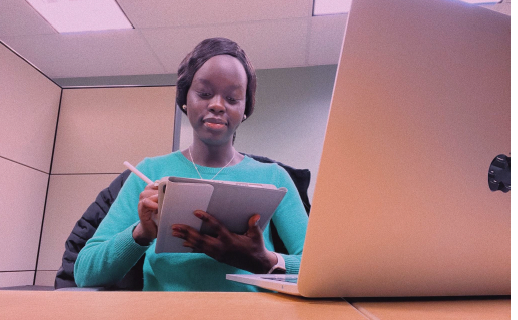by Adowek Ajoung

My name is Adowek Ajoung and I am a first-year student at Drake University. I am a Biology and Psychology double major. This year, I’ve had the privilege of interning at the Evelyn K. Davis Center for Working Families. The Evelyn K. Davis Center, or EKDC, serves low-income individuals in the Des Moines community. They provide a plethora of services. Employing the individuals served is of utmost importance for the center. To achieve this goal, career coaching and resume building help these individuals to build the connections necessary for success. The Center also provides services such as financial coaching, a men’s clothing closet with formal attire, and youth services. My work is primarily done with the youth. My main focus for this year has been to help in building the Youth ExCL program. This was previously a summer program where youth could be employed with community partners and learn more about the workforce. This year-long program is somewhat of a precursor for the summer. The workshops and activities that I assist in developing are intended to set up these students for tremendous success.
Why is this work important?
As the center primarily serves those with low incomes, the main priority of all the programs they facilitate is to empower and give people knowledge. An extreme limiting factor towards success is the deprivation of knowledge. EKDC knows this, and that is why a lot of their programs involve education. In my position, building these students up in knowledge in order to go back to their own communities is extremely important. This is knowledge that they wouldn’t receive otherwise, empowering them to grow and not become limited by their background. The main reason of a lack of access to resources stems from historical racism and redlining. These individuals in the Des Moines area have been subject to redlining, keeping poor individuals poor. The absence of funds being flooded into schools, infrastructure, banks, etc., places them in such an unfortunate situation. The Evelyn K. Davis Center uses its staff to bridge the gap for its clients. A gap that was not a fault of their own.
How has this program overcome difficulties with the pandemic, and other extenuating factors?
Many nonprofits have been impacted, by Covid-19, primarily to their disadvantage. Some clients may not seek out the help they are seeking because of health concerns and other confounding issues. The lack of in-person interaction puts the clients at a disadvantage. With the Youth Excel program, or Y-ExCL, students who have expressed interest are not able to attend. This can be because of school commitments, family commitments, travel problems and more. These factors seem to have been exacerbated through the pandemic. The solution that my work has prided itself on is making the learning self-paced. Through a series of videos, reflection questions and online activities, students are able to receive the same knowledge they would have received in person. Becoming adaptable in various circumstances is one thing the EKDC does tremendously well.
What have I learned?
In my time spent at the center, I have grown in my communication skills and in my creative thinking. Coming up with workshop content that will enrich these kids in a meaningful way has been such a rewarding task. I’ve learned to not assume, but to ask and inquire about the needs of whom I am serving. This has also become one of my biggest takeaways. Assumptions lead to distress when it comes to service. Keeping the focal point on those we serve is fundamental in any service area, and is something I will absolutely keep in mind for future endeavors. In terms of future career paths, I want to keep the same theme of helping the underserved. I want to continue down a career in healthcare, where these same individuals can not only receive knowledge, but receive help that can set them up for a better life. This internship has allowed me to appreciate non-profit work in an enormous way.
What are valuable lessons one could take away from this work?
As we all strive to be active citizens, I have understood that equipping those with knowledge and life essentials can help drastically. What we take as little and insignificant, can change the trajectory of someone else’s life forever. The diligent and beautiful work that EKDC does for the Des Moines community is so inspiring. I am encouraged to go out into my community and do what I can in order to improve the live’s of others. I have also learned that being an active citizen means educating yourself on your own biases, and actively fixing those when conducting service. Being aware of where you are personally, and how that could affect those who you serve is essential. Being wary of overstepping and allowing yourself to be the student fares far more better for the community you serve. It’s not about you, it’s about who you are serving and why. That is what service us all about! This year has absolutely defined my understanding of what it means to be an active and contributing citizen.
If you want to learn more or get involved with the work done at the Evelyn K. Davis Center, please visit the website: https://www.evelynkdaviscenter.org/Pages/welcome.aspx. There are plenty of ways to get in contact with and conduct rewarding service through this program! It is truly the reward of a lifetime.